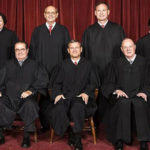Some religious leaders hailed North Carolina’s May 8 passage of a constitutional amendment defining marriage as between a man and a woman as a win for family values, while others vowed to continue the fight for what they call “marriage equality.”
By a vote of 61 percent to 39 percent, North Carolina became the 30th state to constitutionally ban same-sex marriage. What set this referendum apart from other gay-marriage debates, however, was the number of churches — including Baptists — lining up both for and against the proposal.

Mark Creech, a Baptist minister and executive director of the Christian Action League of North Carolina, termed May 8 “a historic day for marriage, a great day for North Carolina and a great day for America.” The Southern Baptist Convention-affiliated Baptist State Convention of North Carolina was one of several faith groups who backed the amendment under an umbrella campaign called Vote for Marriage NC.
More progressive Baptist voices, meanwhile, said the amendment was about more than just marriage. Opponents cited larger issues including religious liberty and unintended consequences the amendment might have on people like single mothers.
Three Baptist organizations — the Alliance of Baptists, Baptist Peace Fellowship of North America and the Association of Welcoming and Affirming Baptists — opposed the amendment in an unprecedented joint campaign titled “Many Voices, One Love.”
Robin Lunn, executive director of the Association of Welcoming and Affirming Baptists, said she was disappointed but not surprised that the amendment passed, but pleasantly surprised by the coalition of religious organizations that came together to seek its defeat.
“It was a coalition of religious leaders from around the state, from across denominational boundaries and particularly from within the Baptist tradition, crossing racial lines,” Lunn said. “It was truly a moment that we need to savor.”
“Despite the sorrow of the moment, the joy that will come in the morning is the joy borne out of these new relationships that this particular battle has provided,” she said. “I am hopeful we will take this defeat with grace, and that we will continue this fight together against discrimination.”
Sign up for our weekly edition and get all our headlines in your inbox on Thursdays
“Nobody can take away love,” Lunn said. “They can make it illegal, but they can’t take it away.”
Albert Mohler, president of Southern Baptist Theological Seminary in Louisville, Ky., said one of the most interesting things from a Christian perspective is how churches lined up on opposite sides of the issue.

Robin Lunn
|
“The issue of homosexuality is one of those that demonstrates the great divide between liberals and conservatives when it comes not only to theology but in particular to the interpretation of Scripture,” Mohler said in a podcast commentary May 9.
“Liberals are able to turn to the scriptures and find a way out of the very clear biblical teachings that make clear that all forms of homosexual behavior are sinful,” Mohler said. “In North Carolina there were many Christians who were surprised by the churches that took such an aggressively liberal stance.”
Mohler said North Carolina has long had its share of liberal Protestant churches, but borrowing a metaphor from the gay-rights movement added that many of them “came out of the closet” on the issue during the competing campaigns.
Creech observed that “Some religious leaders departed from sound doctrine on marriage, betrayed the sacred institution, and opposed the amendment.”
Mohler said that even though gay-marriage bans have been approved in every state so far in which they appeared on the ballot, the battle is far from over, because polls show public opinion shifting toward acceptance of same-sex marriage, especially among younger-age cohorts.
Amy Jacks Dean, co-pastor of Park Road Baptist Church in Charlotte and opponent of Amendment One, wrote a church newsletter article urging parishioners “to hold our ground of radical inclusion and stare right into the eyes of those who seek to oppress children of God and not blink once.”
“Our work of proclaiming the Good News of the gospel of Jesus Christ is not done,” she wrote. “It is only just beginning.”
In addition to the 30 states that ban gay marriage in their constitutions, 12 states prohibit it by statute. Gays may legally wed in Connecticut, Iowa, Massachusetts, New Hampshire, New York and Vermont, plus Washington, D.C. Maryland and Washington state passed laws in 2012 to begin granting same-sex marriage licenses, but they are expected to face challenge in voter referenda. California passed Proposition 8 banning gay marriage in 2006, but it was ruled unconstitutional and is likely headed for the U.S. Supreme Court.
–Bob Allen is managing editor of Associated Baptist Press














We seek to connect God’s story and God’s people around the world. To learn more about God’s story, click here.
Send comments and feedback to Eric Black, our editor. For comments to be published, please specify “letter to the editor.” Maximum length for publication is 300 words.